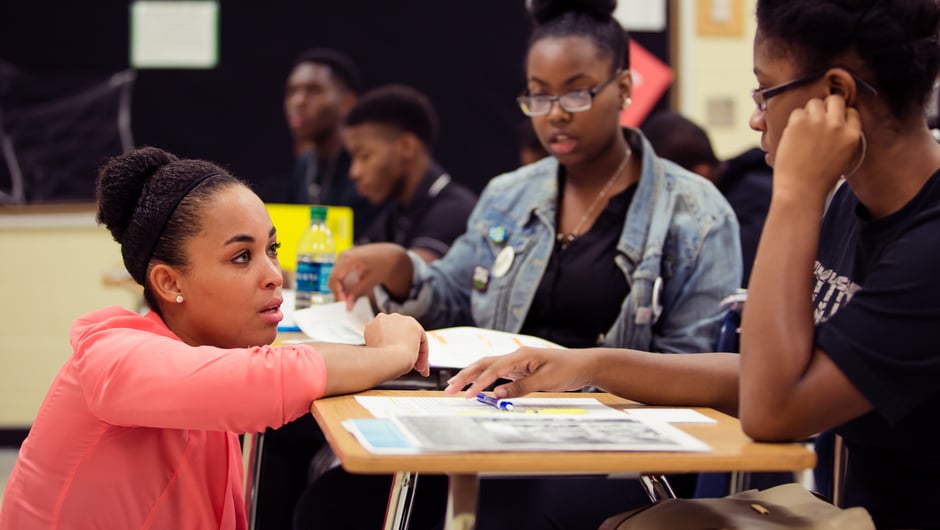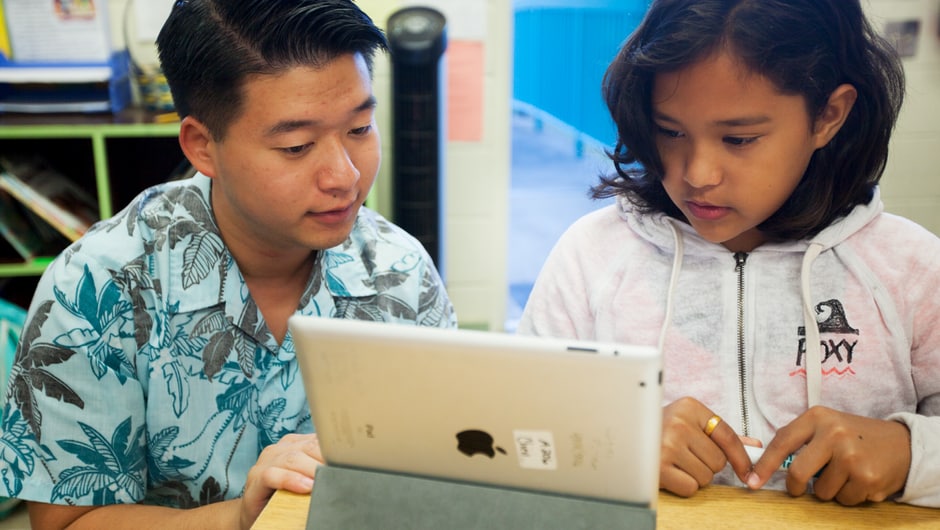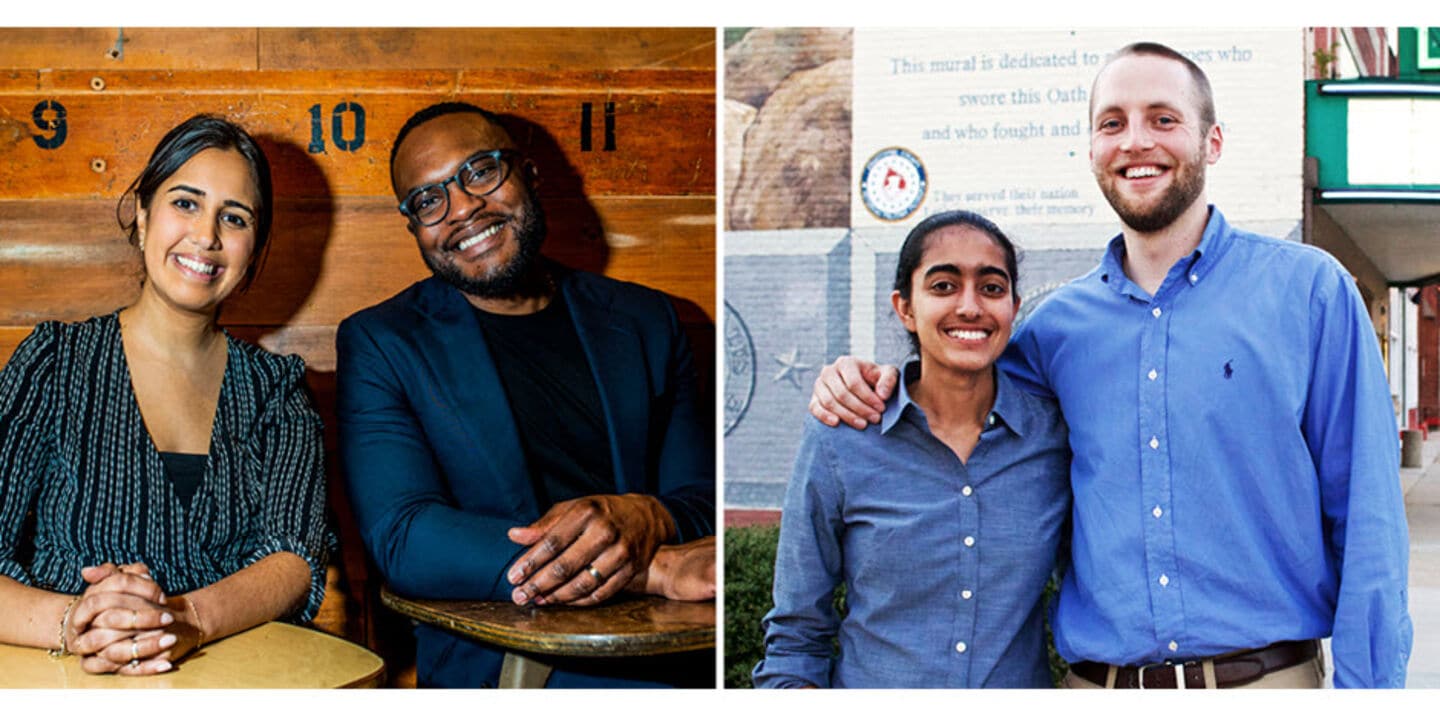
2020 Social Innovation Award Winners Are Helping to Strengthen Communities
These two alumni-founded ventures are working with communities to address trauma and preparing underrepresented students for jobs of the future.
As our county continues to confront inequities that have been exacerbated by the pandemic—many of which are rooted in systemic racism—communities are coming together to reimagine what the future could look like when centered on community-led solutions.
Working alongside students and communities, alumni and corps member entrepreneurs are among those contributing to addressing these systemic inequities—well before recent crises brought them into focus, and with even greater urgency than ever before. They are launching ventures and finding creative new approaches to removing barriers that hold kids and communities back from a life of opportunity.
The Arthur & Toni Rembe Rock Social Innovation Award recognizes these bold, new innovations that expand opportunities for students in low-income communities and address the root causes of educational inequity. This annual competition brings together budding alumni and corps member entrepreneurs to compete for up to $100,000 in funding to develop social ventures that eliminate barriers to educational equity and excellence.
This year two winners were chosen from over a dozen semifinalists. Their ventures are focused on strengthening communities; proving that a restorative approach is effective for helping a North Carolina community address systemic issues that arise from childhood trauma, and creating a path to economic mobility for students of color graduating from high school in New York City.
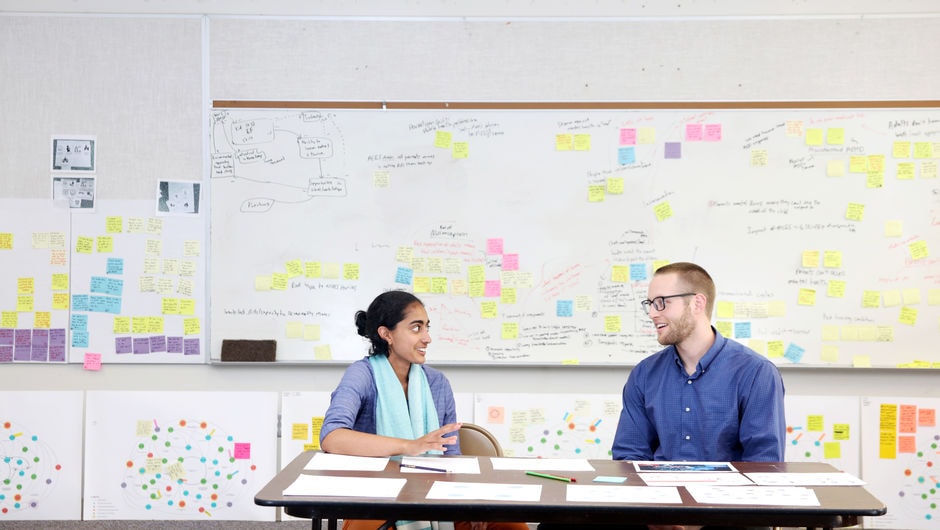
Rural Opportunity Institute
While Vichi Jagannathan and Seth Saeugling were both part of the Eastern North Carolina corps, they didn’t cross paths until after the corps, when both were working on social ventures in the Bay Area. After collaborating on a few human-centered design projects, both felt called back to the community where they taught to apply what they had learned to tackle bigger systemic issues.
In 2017 they launched the Rural Opportunity Institute, a nonprofit with a mission to build a trauma-informed, resilience-focused rural Eastern North Carolina. Over the past three years, the founders have worked with community members in Tarboro, N.C., to address adverse childhood experiences—which they discovered through dozens of interviews with community members are at the root of so many of the community’s problems.
The organization partnered with Resources for Resilience to offer training to address trauma and empower community members with tools to lead change. They’ve since worked with the community to pilot restorative programs in schools and at the local county jail to help students and adults process trauma and reduce anxiety.
Now, amid the COVID-19 pandemic, the founders have transitioned to doing this important work remotely. Here, Vichi and Seth explain how their venture is helping communities tap into their tremendous strength and resilience as the community comes together to cope with the pandemic.
How have you adapted your work over the past few months in light of quarantine/social distancing?
Shortly before the state of North Carolina announced stay-at-home orders, we made the decision to transition all of our in-person work to a remote option. This included hosting virtual community meetings, virtual resilience training, and virtual board meetings. To date, we have been able to offer remote training to many local organizations including churches, educators, and nonprofit volunteers who are responding to immediate needs in the community.
What new needs are emerging from the communities you serve as a result of the pandemic?
Rather than creating new needs, this pandemic has largely exacerbated needs and disparities that have long been present because of the way that systems and institutions operate in our community and in many others like it across the country. However, it has also served to highlight the incredible strength and resilience of the people we serve and follow in this work.
We see a lot of students struggling with remote learning because they lack access to broadband or a personal device. We see exacerbated food insecurity because we don't have public transportation and people on average live several miles from a grocery store. We see people being denied healthcare because their primary entry point is the emergency room and that's now off-limits. We see elderly people left isolated or without care or are in the care of people who may also be exposed to COVID-19 through work. We see mental health issues going severely unaddressed because we already had a dearth of mental health providers and even fewer who are equipped for telemedicine. Not to mention the economic impacts of business closure that all communities are facing.
In the wake of this pandemic, we have seen this community’s infrastructure of support come to life once again to lift each other up. It will be imperative that our community has opportunities and resources to heal and rebuild following this, and many of our institutions and policies will need to be restructured in order to undo the disparities that are being worsened.
How do you think your organization’s focus will shift over the coming months in response to these emerging needs?
In the long-term, we have taken this “pause” to hone in on designing our upcoming ROI Accelerator program that we will launch in 2021. This will be the first-ever accelerator program focused on supporting long-standing community institutions and organizations (such as schools, churches, police departments, hospitals, etc.) in rural communities to become more trauma-informed, and to shift their practices from punitive towards restorative and healing.
While this was always a need in rural communities like ours, we believe that in light of COVID-19 it will be more critical than ever for our community institutions to build resilience within their own staff, and to respond with compassion and healing for the people they serve. We see a collective opportunity to redesign the way our systems operate to be more responsive to and return power to our communities, rather than reverting to longstanding practices that continue to perpetuate historical trauma and oppression.
What is helping you stay positive right now?
We are energized by the history that has shown time and time again that massive and long-lasting change is possible through consistent efforts by small groups of people, and the science that proves that the body is wired for healing and connection. We are standing on the shoulders of giants, and are a small part of a long-standing movement for justice and liberation. We stay positive by staying connected to community leaders and partners whose own experiences and perspective give us hope and certainty that our wildest dreams and visions are possible, and that we need to continue forward.
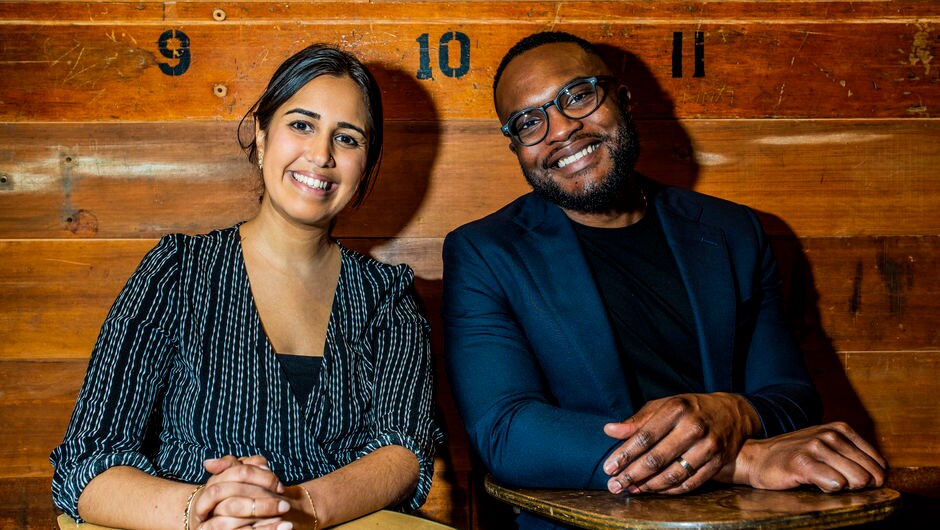
Marcy Lab School
After completing a computer science teaching fellowship following the corps, Reuben Ogbonna (Metro Atlanta 12) was inspired by seeing how motivated his students were to learn specific skills that they could apply in the workplace. Raised in an immigrant family in Harlem, Maya Bhattacharjee (NewYork ‘12) is passionate about helping students who share her background find their path to economic mobility. After working together on staff at Teach For America, Maya and Reuben launched the Marcy Lab School in 2018, with a mission to create an alternative pathway into high-growth tech careers for underrepresented and underserved youth in Brooklyn, N.Y.
The organization provides full-time software engineering fellowships to recent high school graduates to gain skills needed to enter good-paying entry-level tech jobs. Fellows also receive ongoing coaching and mentorship to support their transition into their careers.
Taking on student loan debt and paying for college can be a huge barrier for earning a four-year degree, especially for first-generation college students. As many of the nation’s largest tech companies no longer required a four-year degree, the Marcy Lab school helps create a path for aspiring tech engineers who are underrepresented in the profession, with the goal of fellows going on to launch and lead their own tech ventures.
While the pandemic has had a devastating impact on the economy, particularly in communities of color, providing pathways for underrepresented youth to gain economic mobility is a key part of helping communities recover from the crisis. Reuben and Maya share how they are adapting to a remote workplace and what lies ahead for their work.
These 4 TFA NY Alumni are Inspiring Students to be Leaders in STEM
Students are strengthening their STEM skills for present-day problem-solving, and becoming confident, in-demand leaders in a growing industry. Read more.
How have you adapted your work over the past few months in light of quarantine/social distancing?
We have embraced remote work as the new normal. Though we plan to bring our operations back to our physical headquarters once it is safe to do so, we are investing in improving our distance learning methods and our remote team management to serve more students effectively. As more companies are shifting to a remote workplace, we see this as an opportunity to prepare our students for this work trend that will only grow in the future. This shift also allows us to benefit from brilliant, mission-aligned team members from across the country.
What new needs are emerging from the communities you serve as a result of the pandemic?
We are seeing a surge in interest in our programming from prospective students as the pandemic takes a toll on local economies. Our immediate community has seen jobs in food service, entertainment, and hospitality disappear as a result of the way that COVID-19 has impacted New York City.
While we are hopeful about the resilience and return of these industries, we feel a sense of urgency to step in and serve more people in order to enable them to earn in the near term and support their families.
How do you think your organization’s focus will shift over the coming months in response to these emerging needs?
We aim to grow by over 100 percent in the next year. We will be designing our next academic program to prepare students for careers in data engineering and data science, a field anticipated to grow as our country begins putting the infrastructure in place to recover from this crisis and return to work. We will be doubling down on distance learning, a move that we believe will allow us to expand our impact while maintaining a high-quality educational experience for each student.
What is helping you stay positive right now?
Every morning we meditate with our students (our favorite app is Liberate) and share one thing that we are grateful for. What keeps us positive is the pride that our students have in the work that they are doing and the hope and aspirations they have for their futures.
Sign up to receive articles like this in your inbox!
Thanks for signing up!
Content is loading...






